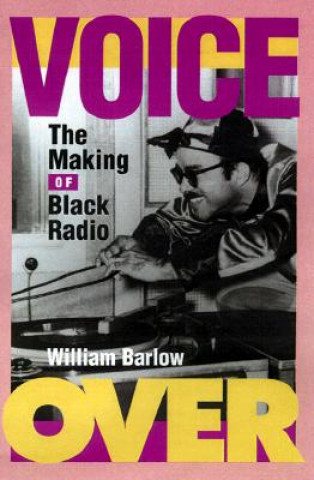
Versand
Kaufberater





Passt nicht? Macht nichts! Bei uns ist die Rückgabe innerhalb von 30 Tagen möglich
 Geschenkgutschein
In einem beliebigen Wert
Geschenkgutschein
In einem beliebigen Wert
Mit einem Geschenkgutschein können Sie nichts falsch machen. Der Beschenkte kann sich im Tausch gegen einen Geschenkgutschein etwas aus unserem Sortiment aussuchen.
Voice Over
 Englisch
Englisch
 93 b
93 b
30 Tage für die Rückgabe der Ware
Das könnte Sie auch interessieren


In "Voice Over", a celebration and history, William Barlow explores the entire landscape of Black radio from the early days - when the white public accepted the black-face buffoonery of "The Amos and Andy Show" and "Beulah" as a fair depiction of African-American life - to the rise of personality jocks and the contemporary scene of corporate buyouts and uncertain fate. Barlow, whose voice has been heard on WPFW (Washington, D.C.) for many years, brings an insider's knowledge to this account of Black radio as a predominantly local and still powerful medium. Many of the broadcasters he profiles - Jack Cooper, Paul Robeson, Richard Durham, Cathy Hughes, Al Benson, Georgie Woods, Peggy Mitchell, Hal Jackson, Jocko Henderson, Mary Mason, Wesley South, Martha Jean "the Queen" Steinberg, to name a few - became not only celebrities but also respected members of their communities. Atlanta's Jack "the Rapper" Gibson, for instance, tells how he literally shared his microphone with Rev. Martin Luther King Jr. to announce meetings and rally listeners around a key issue. By showing the extent to which so many Black broadcasters achieved the status of trusted and influential community leaders, Barlow acknowledges that their grassroots activism was an indispensable and often overlooked part of the ongoing African-American civil rights movement. "Voice Over" also addresses Black radio's broadly significant role in entertainment and shifting race relations. Until the rock and roll revolution, audiences had largely been segregated. The African-American personality jocks who introduced white teens to rhythm and blues were a revelation; their wild style personas and the music they played changed broadcasting while it enthralled a multiracial audience. Although the stations that introduced the enormously popular music were identified as Black, virtually none was Black-owned or managed. The broadcasters who distanced themselves from music industry perks and payoffs proposed an ambitious agenda for change. This little-known story sets the stage for how the proliferation of Black-owned stations and networks occurred and for Barlow's assessment of the instability of today's Black radio scene. Written for a broad spectrum of readers - from nostalgic fans of Jocko and Georgie Woods to loyal listeners of surviving stations and media watchers committed to diversity in broadcasting - "Voice Over" tells the whole story of the making of Black radio. Author note: William Barlow is Professor, Department of Radio, Television, and Film, at Howard University and the author of ""Looking Up at Down": The Emergence of Blues Culture (Temple)".
Informationen zum Buch
 Englisch
Englisch
Kategorie


 Kontakt
Kontakt Wie einkaufen
Wie einkaufen
























